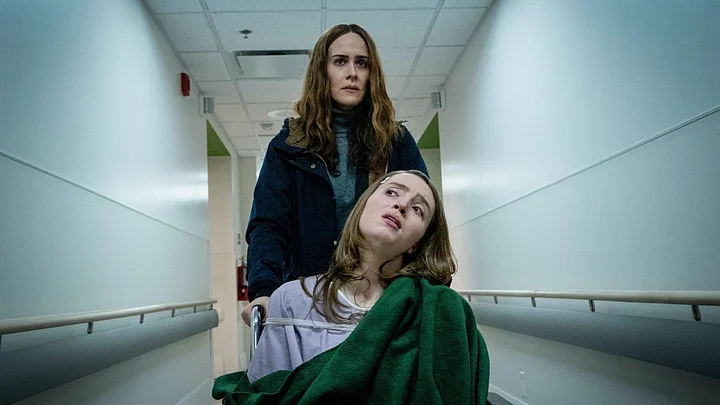Chloe Sherman (Kiera Allen) is 17 years old, and dreams of going to college. Diagnosed with asthma, diabetes, lower-body paralysis and an irregular heartbeat among other maladies, she has been raised under strict surveillance and in total isolation by her mother, Diane (Sarah Paulson). It's for her own good. Or so her mom tells her. Suspecting Diane might be deliberately isolating her from the outside world, Chloe schemes to discover the truth.
If you've watched Sharp Objects or The Act recently, alarm bells should start ringing a few minutes into Run. No doubt Munchausen Syndrome by Proxy (MSbP), now known as Factitious Disorder Imposed on Another (FDIA), is having a moment. Diane Sherman is not the first movie mom to exaggerate, induce or make up ailments for a child who isn't really sick.
In an effort to write darker and more complex roles for women, filmmakers have often used various forms of mental illness as shorthand. Apparently, that’s nuance. Moreover, these portraits are rarely sensitive, often sensationalized, and further stigmatize mental illness.
Aneesh Chaganty's second feature opens to a distraught Diane, who has her hands pressed against the incubator keeping her premature baby alive. Before the doctors in the background can deliver the potentially terrible news, the film cuts to 17 years later.
Searching proved Chaganty enjoys working within certain limited parameters. In his debut feature, a father was forced to look for his missing daughter within the confines of computer and phone screens. In Run, a daughter must find out the truth about her mother within the confines of her home. Despite the limitations in setting, Chaganty still engineers plenty of anguish into its architecture, turning everyday circumstances into sources of anxiety for Chloe.
Home, for Chloe, is a hostile prison. Freedom, for her, ends at the front door, which is almost always locked by her mother. Notwithstanding, she eagerly waits for the mailman to bring good news with college acceptance letters. Here, Chaganty offers first hints that Diane's affection goes beyond benign motherly love. She scrambles to censor all correspondence before Chloe gets her hands on them.
The camerawork is incriminating in a very Hitchcockian way. But unlike Hitchock, Chaganty seems to favour surprise over suspense, and that’s the movie’s undoing.
Hitchock aside, Chaganty cited M Night Shyamalan as another big influence. And it shows. He sure enjoys his twists. The problem with the post-Sixth Sense Shyamalan movies is the twists inevitability minimize the simple joys of watching them without the continual awareness that they are building to some earth-shattering reveal. This often means a large chunk of the movie is mere build-up, and often saps our investment in the proceedings. But the payoff doesn't always match the build-up. The same holds true for Run. For if you paid attention to the events in the prologue, you would see the twist coming a mile away. So, the twist only disrupts its continuity.
Tension in Run is mined from its isolated setting and Chloe's limited mobility. With the only working phone in her mom's bedroom, Chloe tries to find out what pills she's being given by dialling a stranger. But she must do it while frequently checking up on her mom, who's working in the garden, through the window. Chaganty cuts from Chloe in the bedroom to Diane in the garden to great effect. When Chloe is locked in her own bedroom in another instance, she uses make-shift tools to surmount her mom's devious hurdles. It’s a thrilling sequence, paced to her increasingly rapid breathing.
Parts of Run's DNA can be traced to Petrosinella and its Brothers Grimm variant, Rapunzel. A young woman is confined to a near-impenetrable home, manipulated into believing it's in her best interest by an overprotective mother. Yet, she dreams of seeing the world beyond her sheltered walls. Only in Run, she can't rely on Prince Charming to come save her. Chloe must take the plunge, armed with just her grit and gumption.
In her debut role, Kiera Allen affords the viewers an emotional anchor as she combs for clues and plots an escape. Sarah Paulson makes us feel the pain of losing a child so fiercely, Diane somehow appears both frightening and sympathetic.
It's her American Horror Story pedigree which suggests there's more to this film than there really is.
Diane has a bit of that Annie Wilkes streak in her. She has helicopter-parented her daughter into a reliable daily routine: Chloe must do her exercises, take her various pills, and finish her homework on time. On rare occasions, Diane takes her to the movies. Monitored around the clock and with no access to the Internet, she has gaslighted Chloe to an extent where she lives in a constant state of fear for her own survival. This fear, and the comfort of motherly affection, become weapons in her hand.
In films with huge time jumps, there are always some head-scratchers. The setup only holds water if you make some assumptions: The medications, the isolation and no contact with neighbours did not raise suspicion once in 17 years. Diane didn't slip up a single time in all that time. Chloe didn't really question her mom’s motives till she saw that pill.
Suspend disbelief. Excuse the far-fetched twists. There are still flashes of a good movie, and by extension, better movies yet to come from Aneesh Chaganty.
(At The Quint, we question everything. Play an active role in shaping our journalism by becoming a member today.)
